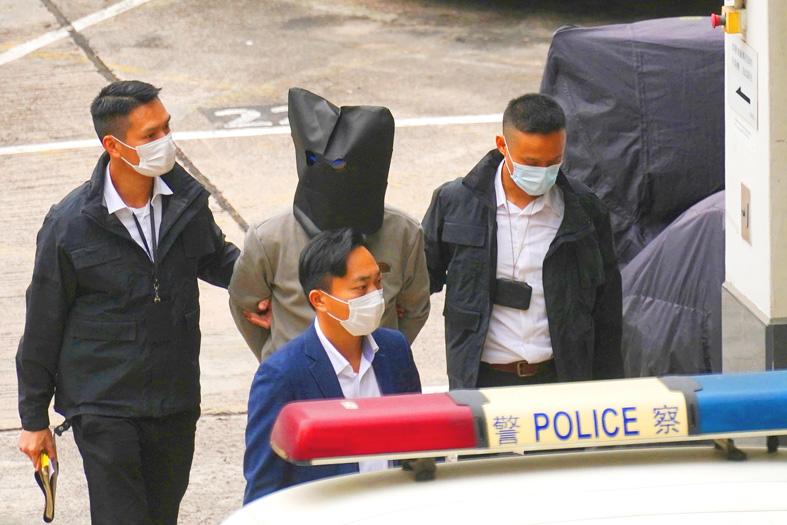Seven Hong Kongers who tried to flee to Taiwan by speedboat to escape protest-related charges were yesterday sentenced to between seven and 10 months imprisonment for acts to “pervert the course of justice.”
The seven men were among 12 people involved in the territory’s democracy movement who were in August 2020 caught by the Chinese coast guard on a speedboat bound for Taiwan.
After serving time in a prison in the southern Chinese city of Shenzhen, all except two have returned to Hong Kong.

Photo: REUTERS
Six of them were sentenced to 10 months, while 32-year-old Li Tsz-yin (李子賢) was sentenced to seven months. Li is currently serving a three-year-and-six-month jail term for rioting and assaulting a police officer.
Defense lawyers had argued that the men had already served time in a mainland Chinese jail, but Deputy District Judge Newman Wong (王興偉) said the men had “given the public a sense of contempt for the judiciary and a deliberate challenge to the legal system.”
The sentencing came just days after another group of young men, including one shot by a police officer in 2019, were caught during a purported attempt to flee Hong Kong by boat.
Steve Li (李桂華), senior superintendent at the Hong Kong Police Force’s national security department, told reporters that the group of four men, aged 16 to 24, had been arrested in the countryside at dawn on Wednesday.
They had all faced rioting and illegal assembly charges, but had failed to show up in court, leading to warrants being issued for their arrests.
Since late 2020 and early last year, the four men had holed up in various places including a windowless room in an industrial building, supported by a group of handlers, some of whom had since fled to the UK, Steve Li said.
“Because they knew the police were investigating their whereabouts, they kept changing their hiding place,” Steve Li told reporters. “They were placed in cardboard boxes and moved about, like cargo, to new hideouts.”
Local media said the group had been en route to a speedboat at a remote pier that was bound for Taiwan, and had been caught with New Taiwan dollars and multiple phone cards among other items.
“We saw that all four of the men had long, unkempt hair, their bodies were very thin and they looked anguished and downcast,” Steve Li said.
One of the suspects, 21-year-old Tsang Chi-kin (曾志健), was brought into court on Thursday with chains around the wrists and waist, sporting shoulder-length hair and dressed in black shorts.
Tsang, a former high-school student, was shot in the chest by police on Oct. 1, 2019, only to be charged with rioting. He later sought asylum in the US consulate, but was rejected.

The CIA has a message for Chinese government officials worried about their place in Chinese President Xi Jinping’s (習近平) government: Come work with us. The agency released two Mandarin-language videos on social media on Thursday inviting disgruntled officials to contact the CIA. The recruitment videos posted on YouTube and X racked up more than 5 million views combined in their first day. The outreach comes as CIA Director John Ratcliffe has vowed to boost the agency’s use of intelligence from human sources and its focus on China, which has recently targeted US officials with its own espionage operations. The videos are “aimed at

STEADFAST FRIEND: The bills encourage increased Taiwan-US engagement and address China’s distortion of UN Resolution 2758 to isolate Taiwan internationally The Presidential Office yesterday thanked the US House of Representatives for unanimously passing two Taiwan-related bills highlighting its solid support for Taiwan’s democracy and global participation, and for deepening bilateral relations. One of the bills, the Taiwan Assurance Implementation Act, requires the US Department of State to periodically review its guidelines for engagement with Taiwan, and report to the US Congress on the guidelines and plans to lift self-imposed limitations on US-Taiwan engagement. The other bill is the Taiwan International Solidarity Act, which clarifies that UN Resolution 2758 does not address the issue of the representation of Taiwan or its people in

DEFENDING DEMOCRACY: Taiwan shares the same values as those that fought in WWII, and nations must unite to halt the expansion of a new authoritarian bloc, Lai said The government yesterday held a commemoration ceremony for Victory in Europe (V-E) Day, joining the rest of the world for the first time to mark the anniversary of the end of World War II in Europe. Taiwan honoring V-E Day signifies “our growing connections with the international community,” President William Lai (賴清德) said at a reception in Taipei on the 80th anniversary of V-E Day. One of the major lessons of World War II is that “authoritarianism and aggression lead only to slaughter, tragedy and greater inequality,” Lai said. Even more importantly, the war also taught people that “those who cherish peace cannot

US Indo-Pacific Commander Admiral Samuel Paparo on Friday expressed concern over the rate at which China is diversifying its military exercises, the Financial Times (FT) reported on Saturday. “The rates of change on the depth and breadth of their exercises is the one non-linear effect that I’ve seen in the last year that wakes me up at night or keeps me up at night,” Paparo was quoted by FT as saying while attending the annual Sedona Forum at the McCain Institute in Arizona. Paparo also expressed concern over the speed with which China was expanding its military. While the US